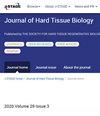双膦酸盐(BP)对颌骨骨坏死患者骨质量和骨结构的影响
IF 0.4
4区 医学
Q4 ENGINEERING, BIOMEDICAL
引用次数: 0
摘要
双膦酸盐(BP)制剂是通过抑制破骨细胞活化、防止椎骨和股骨头骨折来提高骨强度的药物,但其副作用包括颌骨骨坏死(ONJ)。在这种情况下,它被称为药物相关性颌骨骨坏死(MRONJ),病理和微生物学调查表明,感染是一个主要的致病因素。然而,关于ONJ的病因及其致病因素的许多观点仍不清楚。在本研究中,我们给模型小鼠施加BP,并将其颌部暴露于细菌感染中以产生小鼠BRONJ模型,并分析其骨骼结构,包括分析拔牙腔周围骨骼的质量。我们发现未暴露于细菌感染的小鼠不会发生ONJ,而那些暴露于细菌感染的小鼠发生ONJ表现出异常的胶原纤维排列和不良的生物磷灰石晶体排列。对愈合不良的拔牙腔周围骨骼区域的分析也表明拔牙质量很差。这些结果表明,尽管使用BP增加了骨密度,但它降低了胶原纤维的排列,降低了骨质量。单独使用唑来膦酸钠(Zol)可导致上皮愈合,但降低骨质量。此外,提示细菌感染可能发展成类似BRONJ的情况。本文章由计算机程序翻译,如有差异,请以英文原文为准。
Effect of Bacterial Infection on Bone Quality and Structure in Osteonecrosis of the Jaw by Bisphosphonate (BP) Administration
Bisphosphonate (BP) formulations are drugs that improve bone strength by suppressing osteoclast activation, preventing fractures of the vertebrae and the femoral head, but their side effects include osteonecrosis of the jaw (ONJ). In this case it is known as medication-related osteonecrosis of the jaw (MRONJ), and pathological and microbiological investigations have suggested that infection is one major causative factor. However, many points regarding the etiology of ONJ and its causative factors remain unclear. In this study, we administered BP to model mice and exposed their jaws to bacterial infection to produce a mouse model of BRONJ, and analyzed their bone structure, including an analysis of the quality of bone surrounding extraction cavities. We found that mice not exposed to bacterial infection did not develop ONJ, and that those mice exposed to bacterial infection that did develop ONJ exhibited abnormal collagen fiber arrangement and poor bioapatite crystal alignment. An analysis of areas of bone surrounding poorly healed extraction cavities also revealed that its quality was poor. These results showed that although BP use increases bone mineral density, it reduces the alignment of collagen fibers and decreases bone quality. Zoledronate (Zol) alone resulted in epithelial healing, but reduced bone quality. In addition, it was suggested that bacterial infection could develop into a condition similar to BRONJ.
求助全文
通过发布文献求助,成功后即可免费获取论文全文。
去求助
来源期刊

Journal of Hard Tissue Biology
ENGINEERING, BIOMEDICAL-
CiteScore
0.90
自引率
0.00%
发文量
28
审稿时长
6-12 weeks
期刊介绍:
Information not localized
 求助内容:
求助内容: 应助结果提醒方式:
应助结果提醒方式:


